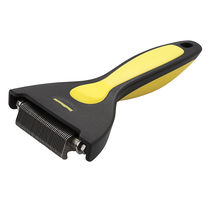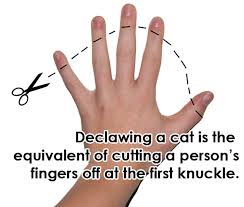2015 NEW PET PRODUCT SPECIAL - WEEK 4 of 5
 Animal Radio's New Pet Product Special is in the final stretch. Our #5 pick was Kitty Kush Catnip. #4 the Green Interactive Feeder. #3 pick, the VOYCE activity monitor. This week we're giving away an iFetch automated ball launcher to keep your pup occupied for hours. Denny Hamill explains how he came up with the stellar idea.
Animal Radio's New Pet Product Special is in the final stretch. Our #5 pick was Kitty Kush Catnip. #4 the Green Interactive Feeder. #3 pick, the VOYCE activity monitor. This week we're giving away an iFetch automated ball launcher to keep your pup occupied for hours. Denny Hamill explains how he came up with the stellar idea.
Denny Hamill explains that the idea for the iFetch started about five years ago when his grandson, Grant, who was in high school, was to trying to do his homework at the kitchen table. Their toy poodle, Prancer, kept dropping the ball at his feet, begging him to play fetch. Twenty minutes later, with Grant growing tired of the game and Prancer as energetic as ever, Grant finally asked, "What if we made something that could throw the ball for Prancer so I can finish my homework?"
Denny, together with his grandson, built a prototype using a hot-wheel set. Their dog liked it, so they found a company to do some designs. They then launched a Kickstarter campaign on June 17, 2013. Thirty days and more than 1,000 backers later, they had received $88,000, more than four times their original goal.
After almost a year in production, Denny states that the iFetch is doing really well. The original iFetch was made for small dogs to use indoors (it throws the ball 10, 20 or 30 feet). But because of all the requests, they are getting ready to launch another Kickstarter campaign so they can build the iFetch II, which will be for large dogs.
So how do you train your dog to use the iFetch? Denny states that every dog is different. It does require training just like you would do when training your dog to do any tricks. The easiest dogs to train are the ones that are "fetching fanatics." Denny states that it takes dogs anywhere from, "10 minutes to infinity" to learn how to use it. But even if the dog can't figure out how to use it, they still like it when you put the ball in. It is a mystery to them. It just sits there until you drop the ball in and then out pops the ball - amazing! Even if you dog doesn't get it, it is still a nice toy for the family, especially for little kids who really don't know how to play with dogs.
If you need help in training your dog to use the iFetch, Denny states that they have placed a video on their website.
http://www.goifetch.com
Pot For Pets
Sen. Tick Segerblom - SB 372 Medical Marijuana For Pets
 Medical Marijuana for pets is a trending topic among pet guardians and politicians. On this week's show, we'll be examining the pros and cons of medicinal Marijuana for pets suffering from cancer and even anxiety. Dem. Senator Tick Segerblom is even sponsoring SB372 to make it legal to prescribe pot for a pet.
Medical Marijuana for pets is a trending topic among pet guardians and politicians. On this week's show, we'll be examining the pros and cons of medicinal Marijuana for pets suffering from cancer and even anxiety. Dem. Senator Tick Segerblom is even sponsoring SB372 to make it legal to prescribe pot for a pet.
Marijuana for pets is just a part of Bill SB 372. Sen. Segerblom's proposal is that, with a veterinarian's prescription, you would be able to go to a medical marijuana store and purchase medical marijuana for your pet. What is currently happening is that people want to give it to their pets but they have no viable way to do it. Under the bill, it would be like going to a doctor and getting a prescription, so you just couldn't buy it yourself. Hopefully a veterinarian would prescribe it because it would work for your pet's ailments.
Two years ago Nevada passed a medical marijuana law, which would allow for the sale of marijuana through licensed dispensaries. They have learned in the last two years that a lot of technical changes needed to be made. The bill was created to address those changes. However, when Sen. Segerblom was approached with the issue of including pets, he decided put it in the bill, thinking that it was a reasonable idea. Since then, he has come to think it may not have been so reasonable because it has taken away some of the real ideas behind the bill.
 Sen. Segerblom is not personally advocating marijuana for pets, but believes if you are going to give it to your pet, you should at least do it under a veterinarian's care. Sen. Segerblom has learned that a lot of the issues like cancer and arthritis that people have, dogs also have similar issues and take similar medications. We also know that the medications you take for these issues do terrible things to you, so if this works as an alternative, it couldn't hurt. Therefore arguably if it works for those conditions in humans, it might work in pets. He also mentioned that a lot of people have come forward and stated that they have already given marijuana to their pets.
Sen. Segerblom is not personally advocating marijuana for pets, but believes if you are going to give it to your pet, you should at least do it under a veterinarian's care. Sen. Segerblom has learned that a lot of the issues like cancer and arthritis that people have, dogs also have similar issues and take similar medications. We also know that the medications you take for these issues do terrible things to you, so if this works as an alternative, it couldn't hurt. Therefore arguably if it works for those conditions in humans, it might work in pets. He also mentioned that a lot of people have come forward and stated that they have already given marijuana to their pets.
The problem with marijuana is that no one has been ale to do research because of the federal law, until now, with some of the states out in the West starting to do research.
Sen. Segerblom states that marijuana is already out there and being sold, so why not make it legal and use the tax dollars for education. In fact, Nevada is planning on putting it on the ballet in 2016 to go recreational. He said if you are going to do it, let's test it, regulate it and tax it, so we all make money on it!
https://leg.state.nv.us
Pet Treats Made From Cannabis
Julianna Carella - Treat-Ibles
 Julianna Carella is the CEO at Auntie Dolores Kitchen, which specializes in making Healthy Gourmet options for those who seek natural therapy from alternative medicine derived from the cannabis plant.
Julianna Carella is the CEO at Auntie Dolores Kitchen, which specializes in making Healthy Gourmet options for those who seek natural therapy from alternative medicine derived from the cannabis plant.
Since 2008, Auntie Dolores has grown to become one of the most trusted brands in the medical cannabis community of California and is now introducing Treat-Ibles Pet Treats made from cannabidiol, which contain no THC.
In the world of cannabinoids, two are the most famous: Tetrahydrocannabinol (THC) and Cannabidiol (CBD). While both are derived from the cannabis plant, only THC is psychoactive - resulting in the euphoria associated with consuming cannabis.
Treat-Ibles products are powered by Cannabidiol - which is highly therapeutic but not at all psychoactive. In other words, cannabidiol cannot get any user "high" in the way that THC does. Cannabidiol is completely legal as a hemp-derived product and gives pet owners a chance to help their furry friends overcome their symptoms and conditions, such as appetite & nausea, mood disorders, cardiac health, cancer, brain health and pain.
Julianna explains that there hasn't been a lot of research on this, simply because cannabis has a stigma and because it's a Schedule 1 Narcotic, which has basically eliminated the opportunity to have the research done. On the other hand, she states what we do know is that dogs and all animals, except for insects, have an endocannabinoid system, so the way they respond to the cannabinoids is similar, and in many cases more sensitive, to THC than humans are.
Treat-Ibles are produced in California and currently sold in California. While the product is legal in all 50 states, they are currently going through the process of getting the proper licensing in order to sell it out of state.
Julianna states that so far there haven't been any adverse reactions to the Treat-Ibles and that they are 100% safe and non-toxic, and there is really no way to overdose on them.
http://www.treatibles.com
"HERO PEOPLE OF THE WEEK" - Susan Kurowski - Pets For The Elderly (PFE)
 This week's Hero Person matches seniors with adoptable companion animals. Susan Kurowski knows both the elderly and the adoptable dogs are winners in this scenario. She's saved thousands of animals running out of time at the shelters.
This week's Hero Person matches seniors with adoptable companion animals. Susan Kurowski knows both the elderly and the adoptable dogs are winners in this scenario. She's saved thousands of animals running out of time at the shelters.
Susan Kurowski is the Executive Director for "Pets For The Elderly," (PFE) which is a 501 (c)(3) public charity whose mission is to provide companionship to senior individuals through pet ownership, while saving the lives of companion animals in shelters; animals which might otherwise be destroyed due to lack of appropriate homes, and space limitations.
The program began in 1992 when the founder of PFE sold a very successful mail order business and wanted to do good with his money. The goal of this man was two-fold. He knew the value of a companion animal in his own life and had seen the statistics about how they helped the well-being of seniors and he was also very troubled by the number of animals languishing in shelters facing possible euthanasia because lack of space.
The goal of Pets For The Elderly is a win-win situation. They help seniors (60 years of age and older) afford the cost of adoption, which helps both animals and human lives.
PFE works with a network of shelters. Currently, 46 shelters in 27 states are participating in the program. Many more are on the waiting list and would be qualified to join the program if funds were available.
Last year PFE placed just over 5,200 companion animals, which costs around $300,000. Since they went national, beyond the borders of Ohio and Pennsylvania where they started, they have saved over 62,000 animal lives.
Susan tells us that opening the mail at PFE is always a "feel-good-day" because they receive many pictures of the senior adopters with their new pet. She said almost always both the animal and the person are smiling!
One of Susan's favorite stories is an adoption that took place in Florida. The gentleman was a lonely widower who adopted a little white fluffy dog. When he adopted the dog, everyone made a fuss over them. The gentlemen then grinned and said, "When I walk her - I'm going to be a chick magnet!"
This illustrates not just the joy that the animal brought to him, but this is also the case that when these seniors are out walking their dogs, they get human interaction as people now stop and talk to them.
While people have requested help in adoption fees for other animals besides cat and dogs, PFE currently holds to just cats and dogs, as they feel that snakes aren't cuddly!
PFE urgently needs your help! Your monetary donation can make a difference. Few causes can have the potential benefits that will result from your contribution. You not only save the life of an animal, you can make a dramatic difference in the life of an elderly person at the same time.
http://www.petsfortheelderly.org
Thinking Globally. Acting Locally. Do you know someone that should be nominated for our Hero Person of the Week? Send us an email to: YourVoice@AnimalRadio.com.

Animal Radio's HERO PEOPLE is brought to you by Zeuterin a safe, permanent and virtually painless alternative to surgical castration.
 What's Your Vet-iquette - How to Be a Good Veterinary Client -Dr. Debbie
What's Your Vet-iquette - How to Be a Good Veterinary Client -Dr. Debbie
Sure you think your vet visits go off without a hitch, but do you know how to be a good veterinary client, the kind veterinarians rave about? Follow these suggestions to participate as a vital part of your pet's medical care, to ensure your pet gets the most efficient care, and to always be greeted with beaming smiles.
Be Prepared
Before you arrive at the office with a sick pet, know your pet's ins and outs. Without a pertinent history from you, your veterinarian may need more diagnostic tests to sleuth out the answer to the problem. That takes time and can cost you more in veterinary bills.
Expect the questions your vet is likely to ask you. Has your pet been eating? What types and brand of food do you feed him? Is there diarrhea or constipation?
Bring Evidence
Nothing is more useful to your veterinarian as seeing something with her own eyes. Bring evidence like stool samples, vomited material, and medications your pet is receiving. Has your pet chewed on some unusual plant in the backyard? By all means bring a sprig of that plant.
Document Video On Your Smart Phone
This can be immensely helpful to your veterinarian to witness behaviors that may be intermittent. I've been thankful when owners bring smart phone video of seizures, separation anxiety behaviors, and respiratory ailments.
Video eliminates misinterpretation by pet owners, and can permit a quick veterinary diagnosis. Vomiting and regurgitating may look similar, but are caused by different disorders. Pets strain to defecate with both diarrhea and constipation. Inspiratory wheezing, coughing, congestion and reverse sneezing are often described similarly by owners.
Trust Valid Resources
By all means do your research in advance of your veterinary visit. Know what questions to ask. But remember that the internet is abounding with both good and blazingly incorrect information, some based on opinions and conjecture without any sound medical basis. Pet owners who value Dr. Google's opinion over their veterinarian, who has examined their pet, could put their pet's health care in jeopardy.
Confine Your Pet
Make sure your pet is secure before entering the veterinary hospital. Don't underestimate the unpredictable things pets do in a noisy, crowded waiting room. Birds fly off shoulders landing in snack zone of nearby dogs. Dogs instigate fights, and cats flee the waiting veterinary staff's arms. Pay attention to where your pet is and don't allow your pet to approach other animals without the owner's consent. Some animals are there because they are sick, and could bite in unfamiliar surroundings.
Dogs should be on a secure leash. Flexi leashes are dangerous in the veterinary hospital allowing dogs to bolt quickly toward another dog, or to entangle limbs of humans or other animals in the waiting room. Cats and exotic pets should be secured in an appropriate pet carrier.
If you have a pet that has been or could be aggressive to veterinary staff, absolutely share that information before the visit starts. Veterinarians look out for the safety of people in their employment and appreciate a heads-up in advance to avoid potential staff injury.
 Optimize Your Face Time
Optimize Your Face Time
So now you are in the exam room with the doc, so make the most of it. Put the cell phone away, and by all means…don't waste time taking a phone call if medical staff is standing in front of you.
Avoid distractions that will limit your ability to communicate with your veterinarian. This might include a roomful of boisterous children or other pets. If possible, arrange child care or pet sitting so your sick pet gets prime attention and you don't miss any details of the visit.
Emergencies Happen
At the vet office, we recognize how valuable pet owner's time is and try to minimize the wait. But recognize that emergencies are unforeseen and create delays for other pet owners. Most folks understand that emergencies happen and are accommodating during situations as this.
But making a scene or outburst about your wait time, while the veterinary staff tends to a critical pet is just inconsiderate. Recognize that one day your pet could be in that same place and you would be appreciative that your pet's medical emergency was triaged ahead of the waiting routine appointments.
Don't Attack the Messenger
Emotions can run high when you have a sick or injured pet, but it isn't an excuse to be abusive to hospital staff. Obscene language and overly aggressive behavior doesn't help your pet get the care she needs, nor does it endear yourself to those people working hard for your pet's health.
Own Your Own Reality
Pet owners have the daunting responsibility for the health and well-being of pets in their care. That means accepting the level of veterinary care you can pursue, and recognizing choices if finances are limited. Pet insurance can help defer the cost of veterinary care, but there isn't government sponsored Obamacare for pets.
Don't blame your veterinarian for your pet's health maladies, or expect her to cover the costs of treatment. People in the veterinary field do what they do because they love animals, but they shouldn't be expected to take financial responsibility for everyone's pets. I once heard a veterinary colleague respond to an client's question, "Doc, why can't you just do my Sasha's surgery for free?" His response was, "Because my staff needs to get paid and my kids need shoes." Recognize that veterinary offices aren't lending institutions, but rather are small businesses with pressing bills, just as anyone.
Share Your Feedback
Share feedback with the hospital management about service excellence or shortcomings. Every hospital appreciates the opportunity to improve, or the chance to pat staff on the back.
Featured veterinarian known as "Dr. Debbie" on national pet radio program, Animal Radio. Ebook author of "Yorkshire Terriers: How to Be Your Dog's Best Friend"; "Pugs: How to Be Your Dog's Best Friend"; "Mini Schnauzers: How to Be Your Dog's Best Friend"; and "Shih Tzu: How to Be Your Dog's Best Friend."
http://www.drdebbie
It's a Wacky Wednesday Here at the Animal Radio® Studios
WackyWed Contest IS ON - LIKE your FAVORITE pic and the three pics with the most LIKES & SHARES are this week's winner will receive a ShedMonster from Oster.
 TO ENTER Send us your FUNNY pet pic to WackyWed@AnimalRadio.com - (Please put WACKYWED in the subject line & give us your pet's name, your name & where you hail from) If YOUR pic is chosen then spread the word to your friends & family on Wednesday - the pics w/the most LIKES and SHARES will be the winner!
TO ENTER Send us your FUNNY pet pic to WackyWed@AnimalRadio.com - (Please put WACKYWED in the subject line & give us your pet's name, your name & where you hail from) If YOUR pic is chosen then spread the word to your friends & family on Wednesday - the pics w/the most LIKES and SHARES will be the winner!
This week we are giving away either a long or short coat ShedMonster from Oster which is a less stress de-shedding tool that reduces hair on carpets, clothes & furniture.
Go from hair monster to ShedMonster with the ShedMonster Professional De-Shedding Tool. Effective in reducing shedding by up to 90-percent. Used for years by professional groomers, the ShedMonster glides through the coat to remove shedding fur without causing painful brush burns or irritation

Join Animal Radio® on Facebook for Wacky Wednesday! Win great prizes every week for your wacky pet pictures. Last month we gave out goodies from Diamond Wipes, Gibi, Sturdi Products, Pet Acoustics and more. Visit us on Facebook now.
 Animal Radio® News - Tammy Trujillo
Animal Radio® News - Tammy Trujillo
This Time its Not Jerky Treats Made In China
Treats labeled as being made in the United States are tied to dogs being taken to vets with a rare kidney disease. The FDA says it's found that some of the products in question were made with ingredients that came from outside the U.S. However, Doctors at the University of Pennsylvania School of Veterinary Medicine says it's lab has recently diagnosed cases of Fanconi in dogs that ate treats that weren't made in China or with ingredients from China. Similar cases have started turning up in Europe too. What to do? Dr. Urs Giger of the University of Pennsylvania says stay away from giving pets any jerky treats.
 Monitor Pets Flying In Cargo
Monitor Pets Flying In Cargo
We've heard several horror stories about pets and planes in the past few months. Now Delta Airlines has come up with a way for you to fly with your pet and not be a nervous wreck about their safety. It's a GPS device that lets you monitor your pets flying cargo. It costs $50 and attaches to the pet's carrier. It keeps track of where the carrier is and the temperature outside the carrier and can tell if the carrier has tipped over. You can check the stats on a website, and if there is an alert, that goes directly to Delta's call center. The only hang-up is that because of restrictions on cellular communications during flights, you can only check the website before takeoff and landing. Gadget or not, the Humane Society still says not to ship pets as cargo unless absolutely necessary.
Employees Must Love Cats
Would you believe that there is a company that says the most important quality it looks for in new hires is a "love of felines," and it's not a pet store or cat rescue or anything really associated with cats! It's an Internet solutions business in Tokyo called Ferray Corporation and it's actually taken in nine rescue cats to help employees unwind and increase productivity. The cats roam around the office doing all the wonderful things cats do like playing and purring. The company also encourages employees to bring their own pets to work. And it gets even better. If a worker doesn't have a pet, the Ferray Corp pays out a monthly "cat bonus" of about $42 to anyone who adopts a cat that needs a home.
 First State To Ban Declawing
First State To Ban Declawing
New York is on target to become the first state to make declawing cats illegal statewide. Eight cities in California have already banned it, but so far no state has done so as a whole. Animal advocate and Manhattan Assemblywoman, Linda Rosenthal, is championing the law that would make it illegal to declaw domestic, exotic and wild cats, unless where absolutely, medically necessary. Declawing involves actually amputating the first digit of each toe and can cause emotional and health issues for cats. The American Veterinary Medical Association (AVMA) recognizes that in most cases declawing is not medically necessary. In cases where immune-compromised people are getting scratched, the AVMA deems it appropriate to consider declawing as a last resort after everything else has been tried. The ASPCA also strongly opposes declawing unless cat scratches are causing harm to the health of the cat's guardian.
DNA Proves Who Pooped In Your Yard
Would you pay to find out whose dog pooped in your front yard? Apparently, a lot of people would. And a company called PooPrints is making money on it. A lot of homeowner associations are calling them in. A team comes out to your location and takes a DNA sample from all the pets in the complex. They keep the samples on file, and then when some evidence turns up, the ticked off neighbor can send in a bit of the offending poop to find out exactly who it came from. Testing costs between $30 and $50. The company has been in business for five years and now tests in about 1,000 areas in North America.
 A Story With A Tail-Wagging Happy Ending
A Story With A Tail-Wagging Happy Ending
A Pit Bull stolen in December of 2013 from the front yard of Northam and April Morris's home in Bennettsville, South Carolina is finally home. The couple recognized Nina Louise immediately when they saw her on a TV news report about a massive cockfighting bust. They contacted Carolina Waterfowl Rescue, who were taking care of Nina Louise along with 100 roosters and a duck and they got a surprise. Not only did the group have Nina Louise, they also had her 10 tiny puppies. The Morris's are helping Nina Louise recover from her deal and raise her babies until the puppies are old enough to be adopted into families of their own.

NEWS UPDATE brought to you by Drs. Foster & Smith, affordable pet supplies. Low prices every day, so you save on every order.
 Listen to the entire Podcast of this show (#803)
Listen to the entire Podcast of this show (#803)





